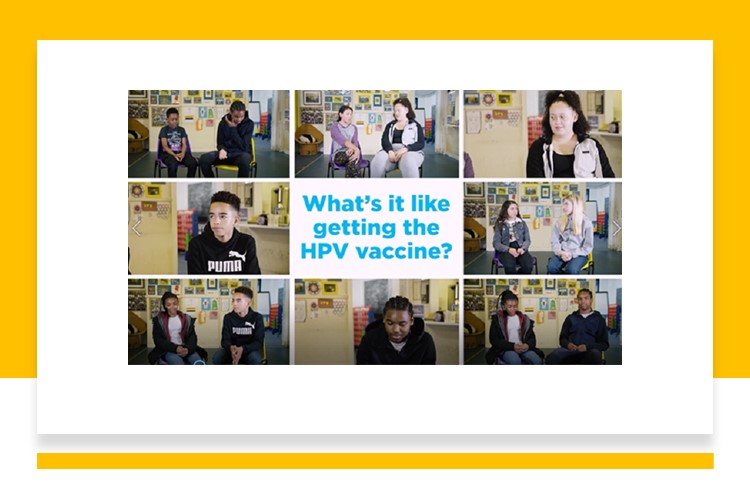7 June 2022
Researchers from the University of Bristol have received funding from the Economic and Social Research Council to test the implementation of EDUCATE – a lesson to help young people find out about the human papillomavirus (HPV) vaccine in schools.

HPV is a common infection that is spread by skin-to-skin contact, including sexual contact. In some cases, persistent infection with high-risk HPV types can lead to the development of cancers affecting both women and men. These include cancers affecting the cervix, vulva, vagina, penis, anus, mouth and throat.
In England, young people aged 12 to 13 years are offered immunisation against HPV as part of the NHS vaccination programme. Research has shown that in England cervical cancer has almost been eliminated among young women who were offered the HPV vaccine. The programme has also been shown to be good value for money for the NHS.
Dr Harriet Fisher and Dr Suzanne Audrey from the National Institute for Health Research (NIHR) Health Protection Research Unit (HPRU) in Behavioural Science and Evaluation at University of Bristol undertook a study in 2020, which showed that some young people had unmet information needs about the HPV vaccine.
To address this, they joined up with colleagues from the NIHR HPRU in Vaccines and Immunisation at the London School of Hygiene and Tropical Medicine, the UK Health Security Agency and NHS England to develop a lesson about the HPV vaccine. Using a ‘person-based approach’, they worked with creative designers, young people, and key stakeholders to co-produce a lesson about the HPV vaccine called EDUCATE.
The resources for the EDUCATE lesson include a PowerPoint presentation, with five films included, and a training document for the educator delivering the lesson. The lesson supports the delivery of the HPV vaccination programme by providing young people with information and answering questions they may have. It prepares them to be vaccinated at school and helps them make the decision to be vaccinated or not. It is designed to be delivered before the school-based HPV vaccination session begins and can be delivered by different professionals, including teachers and immunisation nurses.
Dr Harriet Fisher, Research Fellow at the NIHR HPRU in Behavioural Science and Evaluation at University of Bristol, said: “The implementation study will help us find the best way to deliver the lesson in schools. We have already consulted with young people from the Generation R Young Person’s Advisory Group and others who are involved in delivery of the HPV vaccination programme to inform the implementation plan.
“The next stage of the study is to test the delivery of of the EDUCATE lesson in six schools in London and Bristol. Evidence about the impact will be gathered by observations, interviews with professionals and young people, and a short questionnaire with school staff. Data from the immunisation records to assess uptake of the HPV vaccination programme will also be sought.”
Alongside this study, the researchers have received funding from Research England to identify and engage with people in a position to promote the regional and national scale-up of the EDUCATE lesson as part of the 2022/23 HPV vaccination programme.
If you are a professional who would like to use the resources for the EDUCATE lesson, or you would like to know more about the study, please contact Harriet Fisher for more information.
Paper: Development of an educational package for the universal human papillomavirus (HPV) vaccination programme: a co-production study with young people and key informants by Harriet Fisher et al. in BMC Research Involvement and Engagement.
Video clips of films created as part of the lesson (YouTube)
‘How young people could play a part in a successful COVID-19 vaccination programme’ (Blog)
‘Educating young people about the HPV vaccine’ (News story)
Further information
About the NIHR Health Protection Research Unit [HPRU] in Behavioural Science and Evaluation at the University of Bristol
The NIHR HPRU in Behavioural Science and Evaluation at University of Bristol is one of 14 HPRUs across England, part of a £58.7 million investment by the NIHR to protect the health of the nation.
The NIHR HPRU in Behavioural Science and Evaluation is a partnership between the UK Health Security Agency (UKHSA) and University of Bristol, in collaboration with MRC Biostatistics Research Unit at the University of Cambridge and University of the West of England.
Each NIHR HPRU undertakes high quality research that is used by UKHSA to keep the public safe from current and emerging public health threats.
About the NIHR
The National Institute for Health and Care Research (NIHR) is the nation’s largest funder of health and care research. The NIHR:
- funds, supports and delivers high quality research that benefits the NHS, public health and social care
- engages and involves patients, carers and the public in order to improve the reach, quality and impact of research
- attracts, trains and supports the best researchers to tackle the complex health and care challenges of the future
- invests in world-class infrastructure and a skilled delivery workforce to translate discoveries into improved treatments and services
- partners with other public funders, charities and industry to maximise the value of research to patients and the economy.
The NIHR was established in 2006 to improve the health and wealth of the nation through research, and is funded by the Department of Health and Social Care. In addition to its national role, the NIHR supports applied health research for the direct and primary benefit of people in low- and middle-income countries, using UK aid from the UK government.